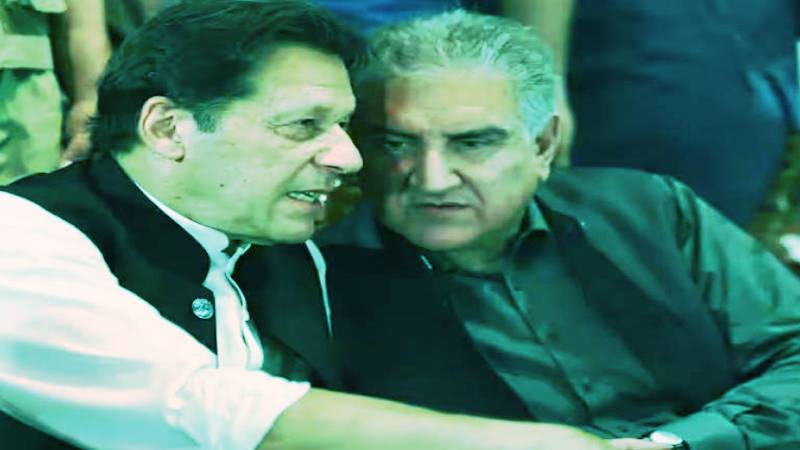
The Supreme Court on Friday granted post-arrest bail to former prime minister Imran Khan and former foreign minister Shah Mahmood Qureshi in the cipher case against surety bonds worth Rs1 million.
The top court also made damning observations that could potentially work in favour of Imran Khan.
The bail was granted by a three-judge bench of the Supreme Court led by interim Chief Justice Sardar Tariq Masood, Justice Mansoor Ali Shah, and Justice Athar Minallah.
Granting the bail to Pakistan Tehreek-e-Insaf (PTI) founder Imran and PTI Senior Vice Chairman Qureshi, the top court found that at this stage, there was insufficient material to establish whether Imran had leaked any information contained in the classified cipher which could benefit a foreign power.
“Having so examined the material available on record, we find that there is no sufficient incriminating material available, at this stage, which could show that the petitioner, Imran Ahmed Khan Niazi communicated the information contained in the Cipher Telegram received from Parep Washington, USA to the public at large with the intention or calculation, directly or indirectly, in the interest or for the benefit of a foreign power nor the disclosed information relates to any of the defence installations or affairs, nor did he disclose any secret official code to the public at large,” read the nine-page judgment on bail applications.
Authored by Justice Mansoor Ali Shah, the judgement also contained an additional note from Justice Athar Minallah.
“We, therefore, are of the tentative opinion that there are not reasonable grounds for believing, at this stage, that the petitioners have committed the offence punishable under clause (b) of Section 5(3) of the Act but rather that there are sufficient grounds for further inquiry into their guilt of the said offence, which is to be finally decided by the learned trial court after recording of the evidence of the parties,” the judgement read.
“The offences of wrongful communication of the official confidential information, etc., as defined in clause (a) to (d) of Section 5(1) of the Official Secrets Act 1923 (“Act”) are generally punishable, under clause (b) of Section 5(3), with imprisonment for a term which may extend to two years, or with fine, or with both, and are bailable under clause (b) of Section 12(1) of the Act,” the top court ruled.
Earlier in the day, a three-judge bench headed by Acting Chief Justice Sardar Tariq Masood and comprising Justice Shah and Justice Athar heard the bail applications of Imran and Qureshi.
Imran and Qureshi had challenged the IHC’s orders of October 10 and November 8, wherein requests for their bails were declined.
“The discretion exercised by the High Court in declining bail to the petitioners is found to have been exercised perversely, that is, against the weight of the material available on record of the case, which warrants interference by this Court,” the top court’s instant judgment observed.
"The only question before the top court in the present case was that whether there are no reasonable grounds for believing, at this stage, that the petitioners have committed the offence punishable under Section 5(3)(b) of the Official Secret Act but rather that there are sufficient grounds for further inquiry into their guilt of the said offence," the judgement stated.
“In this regard, we are cognizant of the one of the elementary principles of the law of bail that to answer the said question, the court cannot indulge in the exercise of a deeper appraisal of the material available on record of the case but is to determine it only tentatively by looking at such material.”
The top court noted that the observations in their judgment are of a tentative nature, which shall not in any manner influence the trial court.
This concession of bail may be cancelled if the petitioners misuse it in any manner, including causing delay in the expeditious conclusion of the trial, the top court ruled.
Earlier, Imran and Qureshi had submitted not-guilty pleas over their alleged role in the exploitation of classified diplomatic cables for political gain.
An appeal against Imran and Qureshi's indictment from October 23 was also considered by the Supreme Court during Friday's hearing.
At the beginning of the hearing, Justice Masood observed that the IHC had previously ruled on November 21 to nullify the challenged indictment.
Consequently, the trial was re-conducted, and Imran and Qureshi's indictments from October 23 in the case were deemed unlawful.
According to Justice Masood, the prior procedures, which the IHC had ruled to be illegal, would not have any bearing on the new indictment.
Hamid Khan, who was representing the former prime minister, argued that the trial was based on the previous charge sheet.
The petition against the previous charge sheet had become infructuous, Justice Masood noted. The judge instructed the lawyer, "If you have an objection to the fresh indictment, then challenge it in the high court."
In response, Hamid asked that the court to postpone the in-camera trial in the cipher case until after the IHC's verdict is announced today.
Barrister Salman Safdar, Imran Khan's other lawyer, stated that Hamid had revised his petitions and asked the court to consider them anew.
After that, the court continued deliberations on the bail pleas and postponed the hearing on the not-guilty plea.

